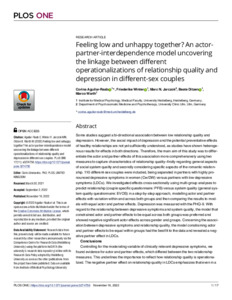|
Feeling low and unhappy together? An actor-partner-interdependence model uncovering the linkage between different operationalizations of relationship quality and depression in different-sex couples
Aguilar-Raab, Corina
;
Winter, Friederike
;
Jarczok, Marc N.
;
Ditzen, Beate
;
Warth, Marco
![[img]](https://madoc.bib.uni-mannheim.de/67562/1.hassmallThumbnailVersion/journal.pone.0274756.pdf)  Vorschau |
|
PDF
journal.pone.0274756.pdf
- Veröffentlichte Version
Download (978kB)
|
|
DOI:
|
https://doi.org/10.1371/journal.pone.0274756
|
|
URL:
|
https://journals.plos.org/plosone/article?id=10.13...
|
|
URN:
|
urn:nbn:de:bsz:180-madoc-675628
|
|
Dokumenttyp:
|
Zeitschriftenartikel
|
|
Erscheinungsjahr:
|
2022
|
|
Titel einer Zeitschrift oder einer Reihe:
|
PLOS ONE
|
|
Band/Volume:
|
17
|
|
Heft/Issue:
|
11, Article e0274756
|
|
Seitenbereich:
|
1-17
|
|
Ort der Veröffentlichung:
|
San Francisco, CA
|
|
Verlag:
|
PLOS
|
|
ISSN:
|
1932-6203
|
|
Sprache der Veröffentlichung:
|
Englisch
|
|
Einrichtung:
|
Fakultät für Sozialwissenschaften > Klinische Psychologie, Interaktions- und Psychotherapieforschung (Aguilar-Raab 2023-)
|
|
Bereits vorhandene Lizenz:
|
 Creative Commons Namensnennung 4.0 International (CC BY 4.0) Creative Commons Namensnennung 4.0 International (CC BY 4.0)
|
|
Fachgebiet:
|
150 Psychologie
|
|
Abstract:
|
Some studies suggest a bi-directional association between low relationship quality and depression. However, the social impact of depression and the potential preventative effects of healthy relationships are not yet sufficiently understood, as studies have shown heterogenous results for effects in both directions. Therefore, the main aim of this study was to differentiate the actor and partner effects of this association more comprehensively using two measures to capture characteristics of relationship quality–firstly regarding general aspects of social system quality and secondly considering specific aspects of the romantic relationship. 110 different-sex couples were included, being separated in partners with highly pronounced depressive symptoms in women (Cw/DW) versus partners with low depressive symptoms (LDCs). We investigated effects cross-sectionally using multi-group analyses to predict relationship (couple specific questionnaire: PFB) versus system quality (general system quality questionnaire: EVOS) in a step-by-step approach, modelling actor and partner effects with variation within and across both groups and then comparing the results to models with equal actor and partner effects. Depression was measured with the PHQ-9. With regard to the relationship between depressive symptoms and system quality, the model that constrained actor and partner effects to be equal across both groups was preferred and showed negative significant actor effects across gender and groups. Concerning the association between depressive symptoms and relationship quality, the model constraining actor and partner effects to be equal within groups had the best fit to the data and revealed a negative partner effect in LDCs.
|
 | Das Dokument wird vom Publikationsserver der Universitätsbibliothek Mannheim bereitgestellt. |
 | Dieser Datensatz wurde nicht während einer Tätigkeit an der Universität Mannheim veröffentlicht, dies ist eine Externe Publikation. |
 Suche Autoren in Suche Autoren in
BASE:
Aguilar-Raab, Corina
;
Winter, Friederike
;
Jarczok, Marc N.
;
Ditzen, Beate
;
Warth, Marco
Google Scholar:
Aguilar-Raab, Corina
;
Winter, Friederike
;
Jarczok, Marc N.
;
Ditzen, Beate
;
Warth, Marco
Sie haben einen Fehler gefunden? Teilen Sie uns Ihren Korrekturwunsch bitte hier mit: E-Mail
Actions (login required)
 |
Eintrag anzeigen |
|
|



 Creative Commons Namensnennung 4.0 International (CC BY 4.0)
Creative Commons Namensnennung 4.0 International (CC BY 4.0) Suche Autoren in
Suche Autoren in